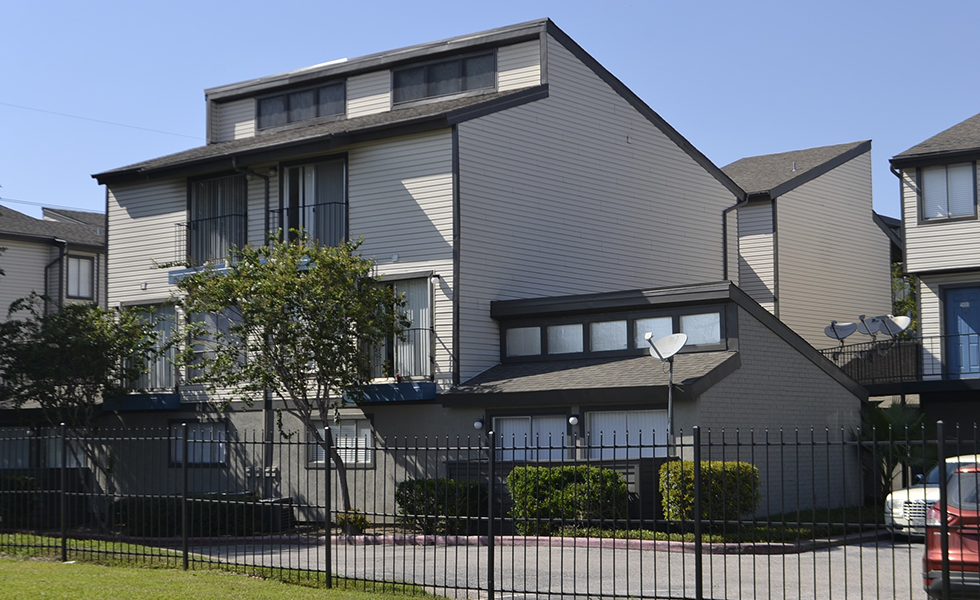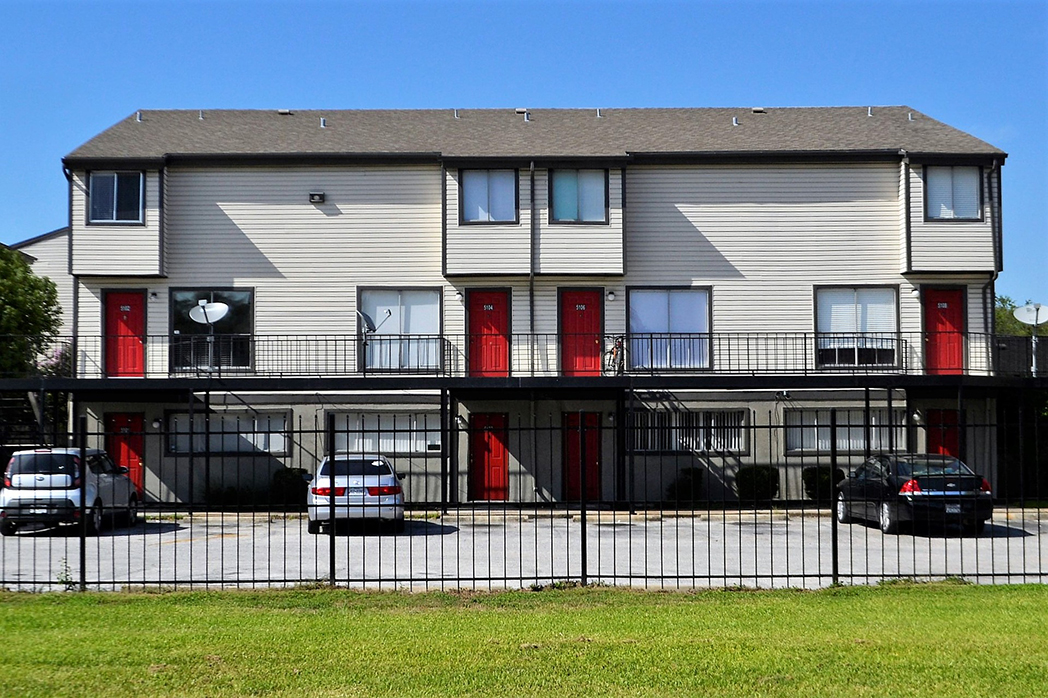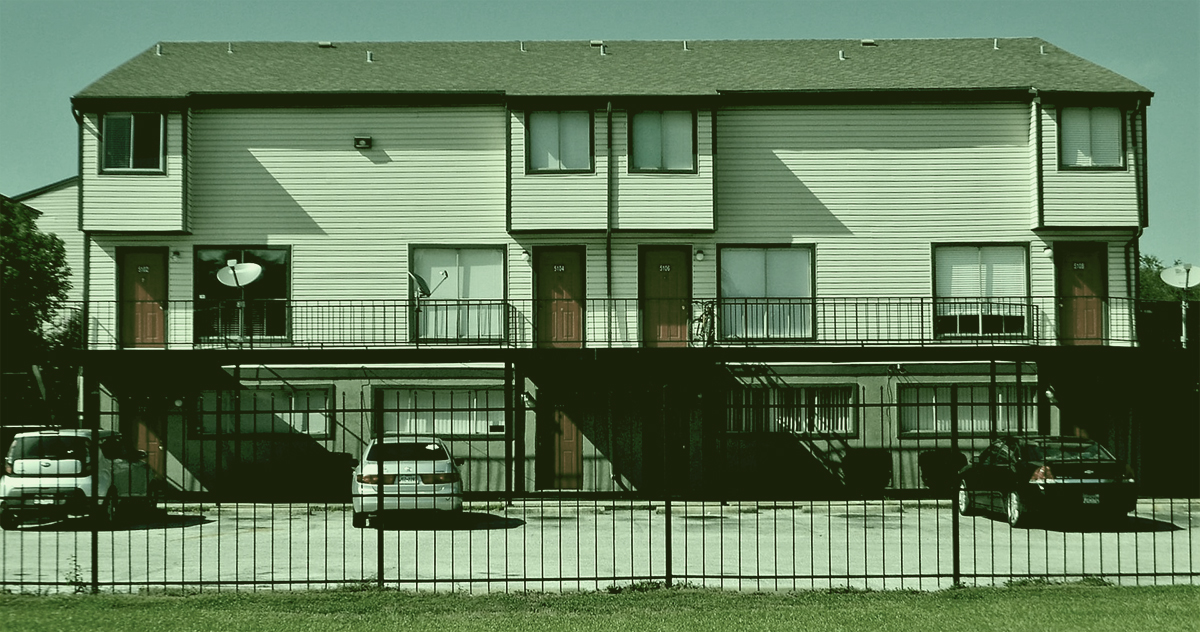
Texas Landlords Are Filing Hundreds of Illegal Evictions
As courts reopen in Harris County, tenants may be removed from their homes as COVID-19 cases skyrocket, despite CARES Act protections that guarantee shelter.

In late April, the landlord at 2929 Dunvale Apartments—a garden-style apartment complex in Midwest Houston with one-bedroom apartments starting at $700 a month—filed to evict six tenants. A month later, seven tenants at Concord at Little York, a three-story complex tucked behind I-45 in North Houston, were hit with eviction filings. Between May 26 and June 17, the property manager at Inwood Grove, a tree-studded property in northwest Houston, filed to evict 17 households.
All of these cases appear to be in violation of the Coronavirus Aid, Relief, and Economic Security (CARES) Act, which prohibits landlords from filing for eviction at properties that benefit from federal subsidies until July 25. The CARES Act covers properties with federally backed mortgages as well as any that participate in federal housing assistance programs, including housing choice vouchers or low-income housing tax credits. It also gives renters an additional 30 days, until August 24, to vacate their unit.
These protections were intended to stabilize renters impacted by the coronavirus pandemic and to prevent widespread homelessness—since mid-March, 2.5 million Texans have filed for unemployment benefits. But the law did not lay out a mechanism for enforcement, nor did it specify how tenants or landlords could find out if their property was protected. Since the CARES Act went into effect on March 27, landlords in Texas have been violating it with impunity, says Eric Kwartler, a public interest attorney at South Texas College of Law Houston. “The law is not being followed,” he says. “That’s demonstrable.”
According to an analysis by Kwartler, of the 3,652 evictions filed in Harris County between March 27 and June 22, at least 368 of those—about 10 percent—appear to be filed in violation of the CARES Act.
In April, shortly after the CARES Act went into effect, the Urban Institute estimated that the eviction moratorium covered 12.3 million of the 43.8 million rental units in the United States—one in every four. Experts now say that’s likely an undercount; in May, the Texas Supreme Court acknowledged that a third of Texas renters could be covered.
Now, as courts reopen in Harris County and dockets fill with eviction hearings, tenants may be removed from their homes despite the legal protections that guarantee shelter as COVID-19 cases skyrocket.
“Any eviction case that’s filed right now, it’s a pretty good chance that it’s covered [by the CARES Act], especially if it’s a multifamily property,” says Eric Dunn, the director of litigation at the National Housing Law Project.
On May 14, the Texas Supreme Court ended its statewide eviction moratorium by allowing courts to hear new cases starting May 19. The court’s ruling required landlords to file an affidavit affirming that their property wasn’t subject to the moratorium on evictions provided by the CARES Act. But Kwartler says that many landlords are signing affidavits in front of court clerks when evictions are filed, suggesting that no investigation has been done into whether or not their property is actually covered.
“What we’ve discovered is that people are signing these affidavits without really knowing what they mean,” Kwartler says.
Carol Estrada, the property manager at Inwood Grove, confirmed that the property currently rents to Section 8 voucher holders, but claims that CARES Act protections do not apply. “We are not a CARES Act property,” she says. “We don’t have any federally funding on the property itself. Otherwise the court would not have accepted the evictions.”
But Kwartler says that’s not how the law works: “All you need is one voucher tenant in a complex to make everyone [who lives there] eligible for CARES Act protection.”
Property managers at 2929 Dunvale Apartments and Concord at Little York did not respond to requests for comment.
Meanwhile, tenants don’t come to court armed with the same information as their landlords and are unlikely to know how a property is financed or whether or not a voucher holder lives there. Their best hope is contacting a lawyer like Kwartler, who has access to a list of the more than 5,000 voucher holders in Harris County, obtained by Houston Volunteer Lawyers through a public information request.
Large corporate landlords have also moved to evict tenants in clear violation of CARES Act protections, says Jim Baker, the executive director of the Private Equity Stakeholder Project. His organization has documented hundreds of evictions filed since mid-March by large corporate landlords and private equity funds, including 10 in Texas. “These are not small mom-and-pop landlords, these are gigantic—in some cases multi-billion-dollar—companies that have decided for some reason that the federal law doesn’t apply to them,” Baker says.
For example, at Villa Siena—a complex north of Dallas owned by the Conti Organization, which owns and operates 8,600 apartment units in Texas—four evictions filed in April appear to violate the CARES Act. According to Denton County court records, all four cases were dismissed in June after courts reopened, but a dismissal could mean the tenant found a way to pay rent, or that they moved out before the hearing. “The law is clear that it prohibits not just actual eviction, removing someone from their home, but also the threat of eviction,” Baker says.
Even if a case is dismissed, eviction filings often remain on a tenant’s record, making it significantly harder to find housing in the future. “That is one of the big injuries that this can cause for people—if you’ve been sued for eviction, even if the case was dismissed, that can often have really dramatic effects on your ability to rent somewhere else,” Dunn says. Landlords often screen potential renters against eviction blacklists, where a renter’s name can remain for years. “A lot of housing providers would just automatically deny anybody who’s been sued for eviction, no matter what the circumstances are,” he says.
The Texas Supreme Court ruling gave Justices of the Peace (JPs), which oversee eviction proceedings, some discretion to delay eviction hearings through the end of September. In mid-June, Travis County JPs ordered that no new evictions would be heard until July 22. Harris County officials have asked to postpone eviction hearings until the end of August. But at least 10 of Harris County’s 16 JPs are now holding a mix of in-person and remote eviction hearings that have unfolded largely behind closed doors. In-person attendance is limited to comply with social distancing guidelines, while proceedings are rarely live streamed.
“There are some serious due process concerns with a digital-only trial and there are serious public health concerns with an in-person trial,” says Zoe Middleton, the Southeast director for Texas Housers, an affordable housing nonprofit. “In my mind, the best and safest option is to continue the suspension of evictions.”
The responsibility of challenging an affidavit falls to those being evicted, most of whom show up to court—or Zoom—without legal counsel. Justice of the Peace David Patronella says judges aren’t empowered to investigate whether or not a property is covered by the CARES Act. “If someone completes an affidavit and no one challenges it, we sort of have to take it,” Patronella says.
Meanwhile, landlords on Kwartler’s list of CARES Act violators continue to show up on court dockets. On Monday, three evictions filed by Concord at Little York appeared on Judge Patronella’s docket. Judgement is pending.
Read more from the Observer:
-
The Texotics: As Texas landowners breed exotic animals like kudu and nilgai, they’re running a massive unplanned and unregulated natural experiment.
-
What the Black Lives Matter Protests Mean for East Texas: Protests where I grew up–where lynchings and KKK marches have occurred in my lifetime–could signal a shift in the region long plagued by racial terror.
-
Texas Relaxed Environmental Enforcement During the Pandemic, State Data Show: Even as the agency reduced enforcement, it continued processing permits that allow businesses to pollute up to certain limits at about the same rate that it did last year.


